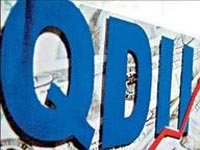| Videos | ? Latest |
|
? Feature | ? Sports | ? Your Videos |
QDII scheme returns to marketplace
With Dubai World struggling to pay off its debts, the global financial crisis is far from over. But here in China, the appetite has returned for investment overseas under a special scheme. After a 17-month moratorium, the foreign exchange authority is again issuing quotas to domestic and overseas mutual funds.
China's State Administration of Foreign Exchange has issued a combined 2.5 billion US dollars in investment quotas to three mutual funds under the Qualified Domestic Institutional Investor scheme. Also known as the QDII, this plan allows Chinese institutions to invest in foreign capital markets on behalf of clients.
Wang Peng, Account Manager of Bank of Communications, Beijing Branch said "I think the reason that mutual funds want to invest now is because they want to grab some short-term opportunities during the global economic recovery. They are likely to invest in some high-risk high-return products."
China halted the issuance of new QDII quotas following the last approval in May 2008. This move reflected a terrible performance by QDII products up to that point. Currently, more than 80 percent of the QDII products managed by foreign mutual funds are still losing money.
Wang Peng said "The timing of mutual fund issuance was the key reason for their loss. Most were issued just before the financial crisis. Those products followed the performance of the global financial markets, which was terrible."
Many experts say the QDII scheme is an important channel for China to manage its mounting foreign exchange reserves -- the world's largest at over two trillion US dollars. Buying when the market is low could be a good strategy.
However, rising expectations for the Chinese yuan's appreciation hinder the attractiveness of investing overseas, as QDII products are traded in US dollars. The costs and risks of the exchange are expected to hold investors back.

 0 Comments
0 Comments






